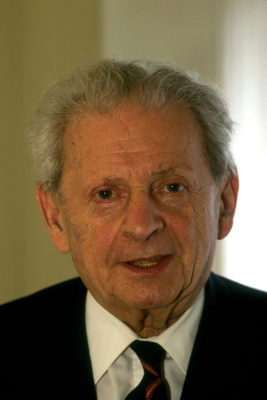Great Throughts Treasury
This site is dedicated to the memory of Dr. Alan William Smolowe who gave birth to the creation of this database.

Emmanuel Lévinas , originally Emanuelis Lévinas
Lithuanian-born French Philosopher, Ontologist, Ethicist and Talmudic Commentator
"The sentence in which God comes to be involved in words is not ‘I believe in God’… It is the ‘here I am’ said to the neighbor to whom I am given over, and in which I announce peace, that is, my responsibility for the other."
"The small goodness from one person to his fellowman is lost and deformed as soon as it seeks organization and universality and system, as soon as it opts for doctrine, a treatise of politics and theology, a party, a state, and even a church. Yet it remains the sole refuge of the good in being. Unbeaten, it undergoes the violence of evil, which, as small goodness, it can neither vanquish nor drive out. A little kindness going only from man to man, not crossing distances to get to the places where events and forces unfold! A remarkable utopia of the good or the secret of its beyond."
"The solitude of the subject results from its relationship with the existing over which it is master. This mastery over existing is the power of beginning, of starting out from itself, starting out from itself neither to act nor to think, but to be."
"The whole acuity of suffering lies in this impossibility of retreat. It is the fact of being backed up against life and being. In this sense suffering is the impossibility of nothingness."
"Things are never known in their totality; an essential character of our perception of them is that of being inadequate."
"This impersonal, anonymous, yet inextinguishable 'consummation' of being, which murmurs in the depths of nothingness itself we shall designate by the term there is. The ‘there’ is, inasmuch as it resists a personal form, is 'being in general'."
"This way death has of announcing itself in suffering, outside all light, is an experience of the passivity of the subject, which until then had been active and remained active even when it was overwhelmed by its own nature, but reserved its possibility of assuming its factual state."
"This world, in which reason is more and more at home, is not habitable. It is hard and cold like those depots in which are piled up goods that cannot satisfy: neither clothe those who are naked, nor feed those who are hungry; it is as impersonal as factory hangars and industrial cities in which manufactured things remain abstract, true with statistical truth and borne on the anonymous circuit of the economy, resulting from skillful planning decisions which cannot prevent, but prepare disasters. There it is, the mind in its masculine essence, living on the outside, exposed to the violent, blinding sun, to the trade winds that beat against it and beat it down, on a land without folds, rootless, solitary and wandering and thus already alienated by the very things which it caused to be produced and which remain untameable and hostile."
"This, available in respect of the past, but captive to itself exudes seriousness of being where he is committed."
"To be conscious is to be torn away from the there is, since the existence of a consciousness constitutes a subjectivity, a subject of existence, that is, to some extent a master of being, already a name in the anonymity of the night."
"To become conscious of a being is then always for that being to be grasped across an ideality and on the basis of a said. Eyen an empirical, individual being is broached across the ideality of logos. Subjectivity qua consciousness can thus be interpreted as the articulation of an ontological event, as one of the mysterious ways in which its 'act of being' is deployed."
"To deny the totality of being is for consciousness to plunge into a kind of darkness, where it would at least remain as an operation, as the consciousness of that darkness. Total negation then would be impossible, and the concept of nothingness illusory."
"To ignore the true God is in fact only half an evil; atheism is worth more than the piety bestowed on mythical gods."
"To kill, like to die, is to seek an escape from being, to go where freedom and negation operate. Horror is the event of being which returns in the heart of this negation, as though nothing had happened."
"We could formulate the result of our analyses in the following way: the existence of material things contains in itself a nothingness, a possibility of not-being. This does not mean that things do not exist but that their mode of existing contains precisely the possible negation of itself."
"What exists for us, what we consider as existing is not a reality hidden behind phenomena that appear as images or signs of this reality. The world of phenomena it-self makes up the being of our concrete life."
"When the forms of things are dissolved in the night, the darkness of the night, which is neither an object nor the quality of an object, invades like a presence. In the night, where we are driven to it, we are not dealing with anything. But this nothing is not that of pure nothingness."
"While in moral pain one can preserve an attitude of dignity and compunction , and consequently already be free; physical suffering in all its degrees entails the impossibility of detaching oneself from the instant of existence. It is the very irremissibility of being."